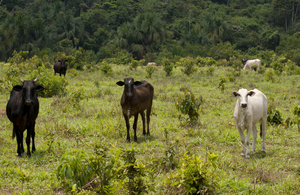Silvopastoral Systems (SPS) Colombia
How the international climate fund (ICF) is helping promote low carbon agricultural practices and protecting forests in Colombia.

Cattle farming in South America
Background
Cattle ranching is big industry in Colombia, occupying around 38% of the land, employing 28% of the rural population and generating 3.5% of the country’s GDP. The agricultural sector, dominated by cattle ranching, generates 38% of Colombia’s total greenhouse gas (GHG) emissions, with deforestation caused by ranching accounting for a further 9% of emissions.
Theme: Mitigation
This project will support the growth of low carbon agriculture in Colombia to reduce emissions, improve the livelihood of farmers, protect local forests and increase biodiversity.
Context
Agriculture is one of the biggest sources of greenhouse gas emissions in Colombia and a key driver of deforestation. The prevailing practice of grazing cattle on open pasture is environmentally destructive and economically inefficient, providing a poor livelihood for many small farmers. Grazing in this way leaves the land degraded and unproductive, generates GHG emissions and results in a loss of biodiversity. In turn, as the land becomes less productive, farmers seek to move on to new land, contributing to the deforestation of Colombia’s biodiversity- and carbon-rich tropical forests.
What is being done?
The UK is providing a £15m grant over 2012 to 2016 to reduce greenhouse gas emissions, improve the livelihood of farmers, protect local forests and increase biodiversity. The programme works with cattle ranchers to improve degraded grazing land by using Silvopastoral Systems (SPS). This means managing the land in a different way: planting trees, shrubs, fodder crops and living fences and conserving existing forest. Despite on-farm and off-farm benefits, SPS have only been adopted to a limited extent in Colombia due to the lack of knowledge of their existence, the high initial cost, and technical complexity. Given the potential for reducing GHG emissions, delivering environmental benefits and reducing poverty there is a strong case for accelerating the spread of SPS: this requires further international support. There is evidence from pilot studies that providing access to credit, technical assistance and Payment for Environmental Services (PES) can achieve conversion of land to SPS, and this is how UK support is being used.
Expected Results
UK funding for this project will help to convert 28,000 hectares of grazing land to SPS, saving around 2MtCO2e over the next 8 years, and create a strategy for increasing the use of SPS in Colombia and beyond.
Links to further info
- Read the investment business case
- Read the first annual review of the project